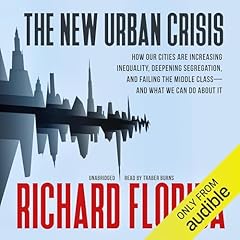
Cities and the Creative Class
No se pudo agregar al carrito
Add to Cart failed.
Error al Agregar a Lista de Deseos.
Error al eliminar de la lista de deseos.
Error al añadir a tu biblioteca
Error al seguir el podcast
Error al dejar de seguir el podcast
 Exclusivo para miembros Prime: ¿Nuevo en Audible? Obtén 2 audiolibros gratis con tu prueba.
Exclusivo para miembros Prime: ¿Nuevo en Audible? Obtén 2 audiolibros gratis con tu prueba.Compra ahora por $15.90
-
Narrado por:
-
Mark Boyett
-
De:
-
Richard Florida
Cities and the Creative Class gathers in one place for the first time the research leading up to Richard Florida's theory on how the growth of the creative economy shapes the development of cities and regions. In a new introduction, Florida updates this theory and responds to the critics of his 2002 best seller, The Rise of the Creative Class.
The essays that make up Cities then spell out in full empirical detail and analysis the key premises on which the arguments of Rise are based. He argues that people are the key economic growth asset, and that cities and regions can therefore no longer compete simply by attracting companies or by developing big-ticket venues like sports stadiums and downtown development districts. To truly prosper, they must tap and harness the full creative potential of all people, basing their strategies on a comprehensive blend of the "3 Ts" of economic development: Technology, Talent, and Tolerance. Long-run success requires a reinvention of regions into the kind of open and diverse places that can attract and retain talent from across the social spectrum by allowing people to validate their varied identities and to pursue the lifestyles and jobs they choose.
Download the accompanying reference guide.©2004 Richard Florida (P)2009 Audible, Inc.Los oyentes también disfrutaron:




















Reseñas de la Crítica
Florida’s question is what leads to sustained regional economic advantage. The short answer is creative people, by which he means those who create (at least virtually). This includes engineers, designers, technologist, and many entrepreneurs, as well as artists, but not necessarily highly educated professionals engaged primarily in non-creative work, even if they are highly paid. Apparently dollar for dollar creative work has far more positive externalities than almost anything else. Who would have guessed?
The focus of this book is the question what attracts creative people. The answer seems to be tolerance, first and foremost. In addition cool outdoor spaces seem to be a big secondary factor. And finally, creative people attract other creative people.
This much is only slightly controversial, but the details are explosively so. Of all the factors the Gay Index correlates highest with economic outcomes and the Bohemian Index is a close second. Other highly correlated factors include the Coolness Index, multi-racialism, outdoor recreation, and live music.
Are the future Steve Jobs and Bill Gates of the world, gay bohemians who spend 30 or 40 hours a week mountain climbing and playing in garage bands? Probably not! Florida presents some data to this affect. Rather he claims that they are misfits who are not widely accepted. So it is the tolerance implied by the Gay Index or Bohemian Index that attracts the creative class. A secondary story seems to be that they find the, often unrealized, but furtive possibility of, extended adolescence attractive.
At any rate once they arrive, they work 90 hours per week to create something that they care about. If they succeed others translated this into something else, and over time this something else morphs into regional economic advantage.
What doesn’t work? According to the number: tax incentives, sporting venues, convention centers, civic pride, sense of place, and everything else that your local, or regional, government is probably trying. In fact, the numbers even suggest that higher education doesn’t work (but it can help a little bit around the edges).
Renewal Can Work, Just Not the Way They Do It
Se ha producido un error. Vuelve a intentarlo dentro de unos minutos.
worth the time spent..
Se ha producido un error. Vuelve a intentarlo dentro de unos minutos.


